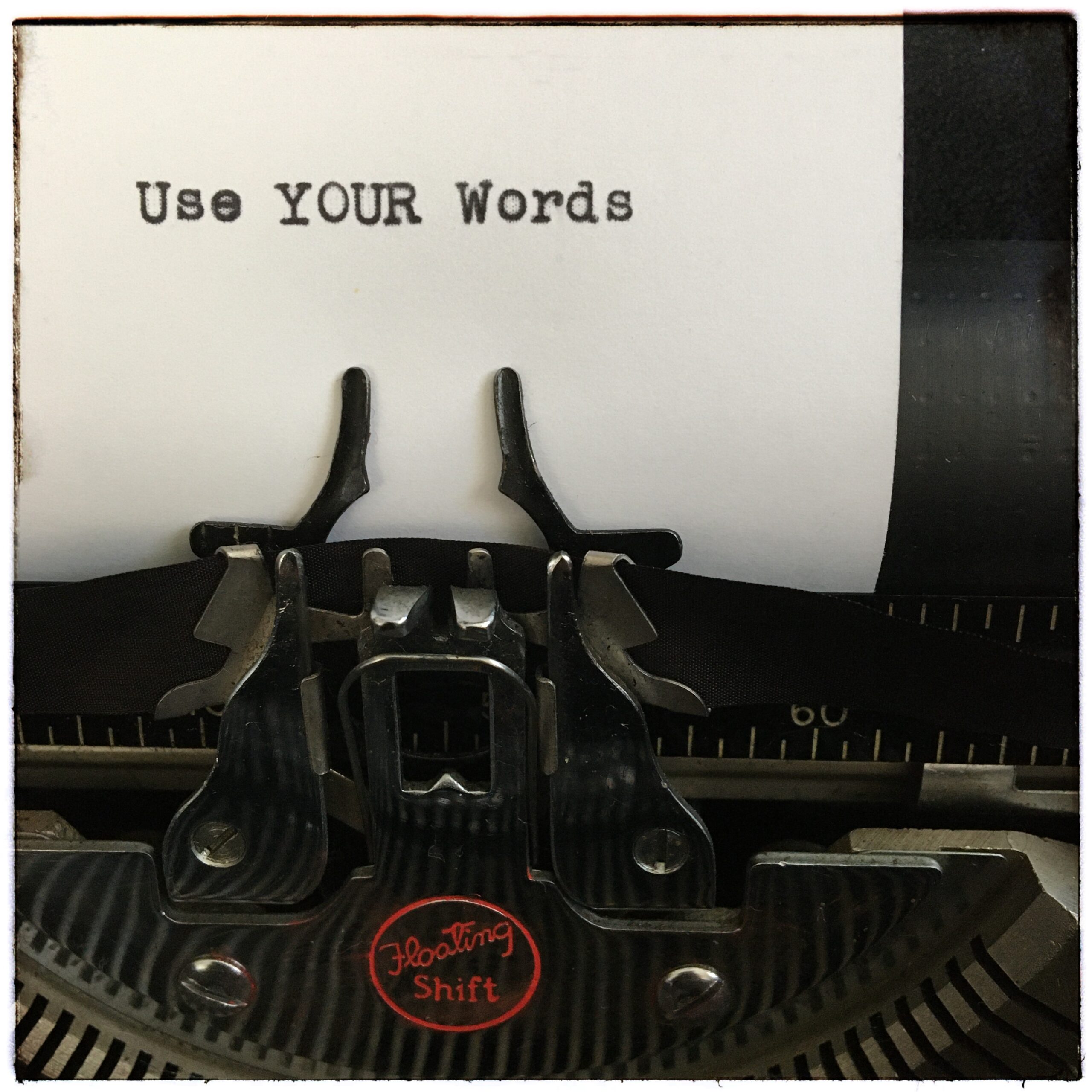
Here Is A Story Called “Use Your Words”
“Copying is the sincerest form of plagiarism.”
David Mamet
I’d like to start by modeling attribution. My dad has said this to me a million times. It’s not only hilarious but points directly at the problem. Copying isn’t, as the old adage goes, a form of flattery. It’s a form of theft. (“Of course I don’t need credit or remuneration for my hard work – just knowing you like it [enough to steal it] fills my heart/belly/wallet/CV.”) Since I did not generate this newly-spun adage, I’ve put it in quotes and added the author’s name, to ensure that people know that these words are his, not mine.
Once upon a time, I was plagiarized. It was shocking to browse ye olde internet, see a post and think, “Gosh, that sounds familiar…Oh, because I wrote it.” When I brought the incident to the attention of the people involved, a potentially incommodious situation blew into a shitstorm en flambé. The people responsible (whether or not they “did it” – the people responsible for the people who may have done it) didn’t respond as I might have expected. Including, but not limited to: no apology and an approximate shitton of gaslighting, with a hefty pinch of name-calling for flavor.
We worked it out, the posts came down, but wow was it uncomfortable. And eye-opening. A friend said to me, “I am just so surprised to see women doing this to other women.” To which I replied, “I’m not; we’ve all been poisoned by the same stuff.”
Which got me thinking about colonialism. The white supremacist, hetero-normative, capitalist patriarchy just loves to say, “I’ll take that.” And, living under these oppressive systems as we do, we’ve all been crop-dusted with the poisonous influence.
We see this in the swimsuit aisle, bikinis covered in the sacred patterns of Indigenous peoples who were disallowed from using the patterns themselves. In rape culture (as if women aren’t capable of enjoying sex, so it has to be removed from us forcibly). In the mining of mountaintops. In the dollars “saved” over industrial meat. In the white rock-n-roller who’s never heard of Sister Rosetta Tharpe. (This paragraph could be very, very much longer.)
We also see it on the internet, over and over, brazen copying, indistinct misattribution. Different disguises, same thief. Rampant, because it’s just so easy to copy and paste. (“How will they/who will ever know?”) Maybe we don’t even mean to. Or perhaps didn’t bother hunting for the original author. Or forgot to mention that we didn’t create that thing we put forward, so people assume we made it. (Further forgetting to correct the assumption.) Occasionally I see things in quotes with no name attached. “INSUFFICIENT!” I yell at the screen. (Also, I realize, insufficient.)
Before I go on, let me be completely clear: someone using my copy on the internet led to an unfortunate misuse of my time and energies. It was a heinous pain in my ass and I was sad about it for community reasons. This situation was not of the same severity as rape or cultural appropriation.
And but it’s also not unrelated. The point I want to make is that the impulse to take without request or reciprocity is the same impulse, however, applied. It grows both gross violences and subtle misdeeds. To varying degrees, but without question, it’s in all of us. And it’s all theft – petty pilfering or grand larceny, but all of it theft.
“Yes, I’ll take that.”
Well, don’t.
Don’t take that.
“What does one do, sensibly, once it’s clear one has swallowed poison,” asks educator Pamela Samuelson. “If one’s got their wits about them, one spits it out. How do we cure ourselves of our colonial heritage? We disavow the ways of colonial heritage.”
Spit. The poison. Out.
Truth provides agency. The truth, in this instance, is “I do that.” Somewhere, somehow, I do. You do. We do.
And we need to hunt for it. (By “we” I really do mean “all of us” – and those of us who have benefited more from the taking will have more work to do.) Every time we find an instance of “I’ll take that” in ourselves, the next logical step (now that we “have our wits about us”) is to assiduously enact its antithesis. Courteously request and learn how to take no for an answer (consent can only be real if dissent is an option). Find exchange in equity and reciprocity. Attribute, celebrate, and acknowledge the work of others – especially that which has made our work possible.
But there’s one more piece.
What shocked me most about the whole copying situation wasn’t so much that they did it (shit happens, benefit of the doubt, ok, alright), or that they are women (identity won’t save us from unfortunate behavior), but that the first sentence off their keyboard wasn’t an apology.
And it needed to be in order for us to proceed with understanding.
Apology composts rift to grow repair. It is the only thing which can because it’s based on acknowledgement of all aspects of experiential relationship – me, you, us, past, present, future. “I see that I did this. I see that this caused you harm, which I not only regret, but take responsibility for – and I commit to doing less harm.” A true apology includes, preferably stated, the commitment to do differently. To grow. May it be, to grow towards one another after a breach has distanced us.
In the words of Maya Angelou, “Do your best. When you know better, do better.”
There is better to know and better to do.
We did not get to choose what poisons came in the cloud of culture. But we can diligently work, quietly examine, fight tooth and nail to locate every last drop in us, and spit that shit out. Again and again. Acknowledge to ourselves and those we have affected. Apologize. Repair.
What is the alternative?
With my thanks to KDay and Zoe Gardner for their peregrine pointed feedback. Deep bow to Pamela Samuelson and Sara St. Martin Lynne for further besideness and word-wielding.
 Willa Mamet: Singer and songwriter, Willa was born in a trunk and raised by performers of all kinds. She’s made music since about that time, singing irrepressibly and playing piano and guitar. With her musical partner, Paul Miller, she recorded two albums, East Hill Road and Let Somebody Love You, both of which won the VT Times Argus “Tammy” Album of the Year in 2013 and 2015. Her next album will be born in Spring 2020. Meanwhile, she plays out sola, with Miller, and other beloveds, bringing her unique blend of rapier tongue and honey heart to her audiences. Hear the voice that Patti Lupone calls, “Heartbreaking. Musical. Contemporary and ancient.”
Willa Mamet: Singer and songwriter, Willa was born in a trunk and raised by performers of all kinds. She’s made music since about that time, singing irrepressibly and playing piano and guitar. With her musical partner, Paul Miller, she recorded two albums, East Hill Road and Let Somebody Love You, both of which won the VT Times Argus “Tammy” Album of the Year in 2013 and 2015. Her next album will be born in Spring 2020. Meanwhile, she plays out sola, with Miller, and other beloveds, bringing her unique blend of rapier tongue and honey heart to her audiences. Hear the voice that Patti Lupone calls, “Heartbreaking. Musical. Contemporary and ancient.”
Willa lives in Oakland, CA, with her beloved upright, her uncle’s guitar, a whole lot of elderberry bushes, and her six-pawed cat. She travels. A lot. For music.
